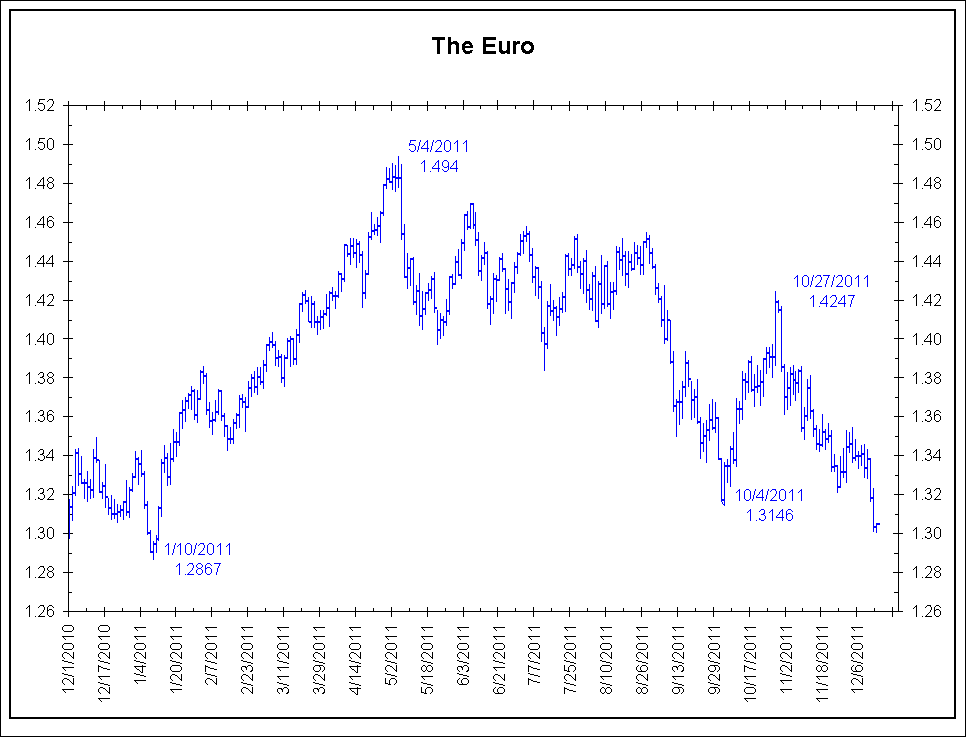Time.com – As the Crisis Refuses to Calm, Scenarios of Euro Collapse Appear
French researcher Emmanuel Todd argues that though the implosion of the euro would produce a period of economic pain, panic, and instability, he says that shock wouldn’t last as long as some predict (18, maybe 24 months), before companies and governments picked up and moved on. And because many euro countries would be starting anew after having brushed off huge amounts of debt through various degrees of default, Todd argues the post-euro economies could be re-constructed on more solid fiscal foundations. Another consequence of such default, Todd says, would be freeing economies and governments from control of what he calls the “oligarchy” of mega-rich investors whose fortunes and interests drive and shape bond markets—and whose gain through safe government securities have influenced political leaders into building up huge public debt in the first place. Another benefit for European nations, Todd says, would be throwing off the domination of Germany, which he describes as dysfunctionally psycho-rigid, and so focused on its own national interests that it no longer cares about ruining its euro partners. Burning the rot from a teetering house, Todd suggests, will be hard and grim work, but at least leave enough of a sanitized structure to rebuild from.
Reuters.com –What If The Euro Collapses?
Swiss wealth manager Sarasin reckons the impact will be a meteor striking the earth and offers following scenarios:
A run on the banks by savers keen to put their money into a core euro country would bring down the banking system of the departing country overnight.
Companies and private households would not have access to loans, nor would they be able access any more cash.
The state, which in this situation should support the banks, would be bankrupt as well. Financial markets would deny it access to funding.
The new currency, once it is introduced, would depreciate by between 30% and 50%, which would multiply the government’s debts.
The depreciation would lead to imported inflation and trigger trade union demand for compensation, setting off a hyperinflationary spiral.
The bankruptcies of banks in Southern Europe would bring about the downfall of their northern counterparts because the latter have lent them large sums of money in the belief that monetary union would last forever.
Anticipating an appreciation, huge capital flows would drive up the new Deutschemark. Many medium-size companies would become uncompetitive overnight.
The Wall Street Journal – ‘Fiscal Compact’ on Euro Set for Mid-2012
A new “fiscal compact” designed to mend flaws in the single European currency’s framework should be completed in the first six months of next year, European Commission president José Manuel Barroso said Wednesday. “We are going to hopefully conclude negotiations for a new fiscal compact during the Danish presidency,” Mr. Barroso told the European Parliament. “The crisis is not yet behind us, there’s a lot of work ahead.” Denmark takes over the European Union’s six-month rotating presidency from Poland on January 1. Germany believed that the agreement of new tougher fiscal stability rules in Europe would be enough to calm down the financial markets but not all other countries at last week’s EU summit agreed, Italian Prime Minister Mario Monti said Wednesday in an address to the Italian Senate. More systematic fiscal rigor is “essential” and the pledges made by 26 EU members last Friday will boost the credibility of public finances in the region, Mr. Monti said.
The Wall Street Journal – Euro Falls Below $1.30
The euro took a hit Tuesday after German Chancellor Angela Merkel expressed her opposition to raising a €500 billion ($652 billion) lending limit for the permanent euro-zone bailout fund, the European Stability Mechanism, which is due to come into operation in July 2012. “The comments contained no surprises, but came at a bad time,” said Dai Sato, senior vice president of the foreign exchange division at Mizuho Corporate Bank. Traders said euro bearishness could persist unless Germany and the European Central Bank step up their contributions to efforts to put an end to the crisis. “But such changes are unlikely to occur soon,” Mr. Sato added. The euro will likely come under pressure against the yen, said Junya Tanase, chief currency strategist at J.P. Morgan in Tokyo, adding that “there’s a chance it may fall below ¥100.” That would be a new 10-year low, breaking the mark of ¥100.77, set in October.
Source: Arbor Research



What's been said:
Discussions found on the web: